#Stalag III
Explore tagged Tumblr posts
Text
Dulag Luft
Places of Interest in Masters of the Air
Masterlist
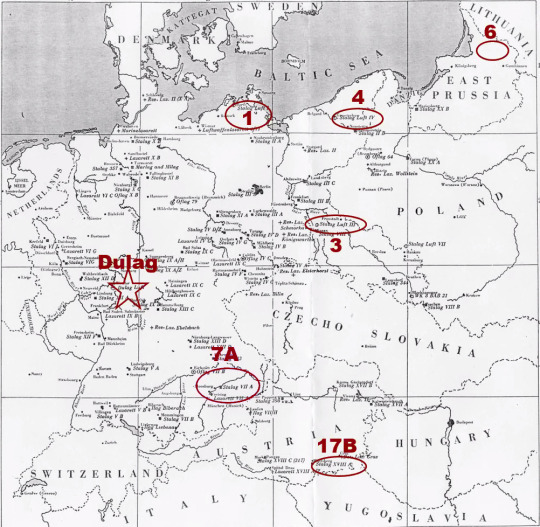
When captured by the Germans, Allied airmen would be sent to Dulag Luft, the interrogation and transit POW camp for the Luftwaffe that was just northeast of the city of Frankfurt. This is the camp where Cleven and Egan were held in solitary confinement for weeks before being transported right outside Sagan to Stalag Luft III.
Dulag Luft interrogators were some of the best in the business, and Miller describes them in Masters of the Air as "deeply skilled specialists who preferred methods more subtle than a rubber hose (Miller, 2007, pg. 386)." Many of these interrogators had spent time in America and were fluent in English. The conversation "would begin by offering him chocolate and cigarettes and then draw him into some light banter about American baseball or movies.... [the conversation] became so congenial that many airmen were unaware that the interrogation had begun (Miller, 2007, pg. 386)."
The interrogators had thick folders on each man and their bomb group. They gathered their information from intercepted communications, Stars and Stripes newspaper articles, and anything else they could get their hands on. It unnerved some of the men that the Germans knew such specific details of themselves, their families, and their bombardment groups. The conditions were terrible, and many of the officers were subjected to solitary confinement for weeks at a time.

Miller writes about this in his book:
“Downed Allied airmen felt safer in the hands of the German military than they did with the local citizenry they had bombed. Luftwaffe police and interrogators were in official charge of captured airmen, and their tactics for extracting information were rough but rarely barbaric. After being captured, Lou Loevsky was shipped with other downed American airmen to Dulag Luft, the Luftwaffe interrogation center for Allied airmen at Oberursel, a suburb of Frankfurt am Main. At one point in his interrogation a smiling Luftwaffe major asked Roger Burwell why the men in his 381st Bomb Group at Ridgewell had not yet fixed the broken clock in their officers club. Airmen who refused to provide military or personal information were usually threatened verbally. Some were told that their families would not be informed they were alive and "safe" until they began to cooperate; men captured without identification tags were warned that they could be turned over to the Gestapo to be executed as spies. One stubbornly tight-lipped officer - married and with children - was told that if he persisted in his obstinacy, a report would go out the next day from the German radio station in Calais that the night before he was shot down he had been at the Grosvenor House in London, in room 413, with an attractive blond woman. Knowing that the information was exactly correct, the major is reported to have fainted on the spot. Prisoners were also softened up by the appalling conditions at Dulag Luft: the tomblike isolation, the starvation rations, and the mice that ran free in the dank cells, and crawled in prisoners' pockets searching for food. Sometimes the promise of a shower, a shave, and a hot meal was sufficient to loosen a man's tongue. The guards also fiendishly manipulated the temperatures in the cells, shutting off the electric wall heaters in the winter and turning them up to intolerable levels, to 130 degrees, in warmer weather. Hundreds of airmen arrived at Dulag Luft wounded and were denied medical treatment, a flagrant violation of the Geneva Conventions regarding prisoners of war. "My interrogator said he could see that I was injured and needed treatment and that my being stubborn would only delay my being sent to a hospital," Roger Burwell re-called. On the other hand, high-ranking Allied fliers believed to possess specialized military information were taken on hunting trips or invited to raucous drinking parties with German officers.
Most of the information was gathered from Allied sources by Dulag Luft's efficient staff, who scrutinized American magazines and newspapers brought in from neutral Portu-gal, including Stars and Stripes, a rich source of hometown information about airmen. Additional information, including logbooks, briefing notes, and airmen's personal diaries, was gathered from clothing and other personal belongings found in the charred wreckage of bombers. These documents often contained highly secret data about flight patterns, the effectiveness of German defenses, and targets marked for future bombing. An officer in the American Air Force's Counter Intelligence Corps noted at the time that 'it was not uncommon for large German manufacturers to ask the Luftwaffe if their factories were on the list, and if so, when they could expect to be bombed." German linguists also monitored Allied airmen's wireless communications. According to Hanns Scharff, the interrogators at Dulag Luft had at their disposal a copious file in which "nearly every single word spoken in the air from plane to plane or from base to plane or vice-versa was carefully noted." As Air Force counter-intelligence experts noted in their own secret files, "nothing in the way of documents, written or printed, was too insignificant to merit close scrutiny" by the intelligence staff at Dulag Luft. A case in point is the airmen's ration cards. Every American flier in the European Theater received exactly the same kind of card, and there was nothing on the card to indicate where he was stationed. But investigators at Dulag Luft were able to identify an airman's bomb group by the way his card was canceled. At Thorpe Abbotts, for example, the clerks on duty in the PX marked the cards with a heavy black pencil. The PX counter was made of rough board. All the cards canceled there carried the impression of its distinctive pattern in the black pencil markings. The Air Force's Counter Intelligence Corps estimated that 80 percent of the information obtained by Dulag Luft was supplied by captured documents and monitored radio traffic, with the remainder coming from POW interrogations. After the war, when he was hired as an interpreter by the American military, Hanns Scharff estimated that all but twenty of the more than 500 airmen he questioned disclosed operational and tactical information that proved useful to the Luftwaffe. Few of these airmen, he emphasized, did it knowingly, or through intimidation or a conscious desire to improve the conditions of their confinement. "I suppose he got something out of me," said one flier, "but to this day I haven't the least idea what it could have been." After being released from Dulag Luft, Loevsky and several dozen other airmen were taken by tram to Frankfurt, where they were herded onto cattle cars and sent deep into German-occupied territory to Stalag Luft III (Air Camp number three), near the town of Sagan, a hundred miles southeast of Berlin, one of the half-dozen main POW camps operated by the Luftwaffe hence the term "Luft," or air-for Allied airmen (Miller, 2007, pg. 387-89)."
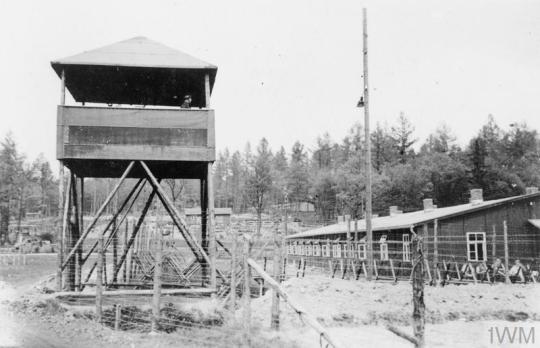
Dulag Luft was the first stop in a sequence of camps and transportation depots that downed airmen had to go through. Hopefully, we'll get to see more of the camp in the show! We're less than a month away, guys! The wait is almost over!!

tag list: @ronald-speirs @footprintsinthesxnd @georgieluz @sweetxvanixlla @coco-bean-1218 @gloryofwinter
message or comment if you want to be added to the tag list! <3

#gale cleven#john egan#masters of the air#gale buck cleven#hbo war#major buck cleven#major john egan#rosie rosenthal#1940s#8th air force#stalag iii#stalag luft iii#dulag luft#pow#100th bomb group#eighth air force#about masters of the air#road to masters of the air#donald miller#masters of the air book
35 notes
·
View notes
Text

"Sunrise on Stalag Luft 3. Someone said it was the biggest use of fake snow in UK film production history. I don’t know about that, but it was a lot of fake snow!!!" -(via John Orloff)
10 notes
·
View notes
Text
Stalag Writing Resource
I randomly stumbled upon a page with detailed descriptions of life in Stalag Luft III, so I thought I'd post the link in case someone is looking for more information about the stalag:
59 notes
·
View notes
Text
For those of us doing research for MOTA fics in the Stalag-arc, this appears to have some very interesting information as well as pictures.
(Do I have to have the name of an actual American POW doctor within Stalag Luft III? No. Do I really want one so I don't have to invent another OC? Yes. Did I find some info about one of the actual American doctors in the camp? Yes, a wee bit.)
57 notes
·
View notes
Text


hey y'all. wtf are we meant to do with this info :)

was aware of other forms of recreation being a thing from other articles, but i've never heard about the fire pool situation! interesting (opens google doc)
#jls refs#the things i accidentally stumble across while looking up entirely unrelated things for fic accuracy??#what do you mean there was a POOL and i've somehow never seen any mention of it??#i've just done a deep dive out of curiosity and it seems like every compound in stalag luft III had one at some point#so. that's certainly something!#masters of the air
43 notes
·
View notes
Text
“Bucky Cleven, the impervious, the invincible, was gone. If he couldn't make it, who could? His good friend, Bucky Egan, didn't talk much that night.”
“The loss of Bucky Cleven over Bremen and Bucky Egan over Münster seemed to have cut the heart right out of the the 100th. Without them the 100th was a shadow.”
"What I can't really handle is that when Cleven and Egan were still around, the men were happier. With them gone, the heart of the 100th has stopped beating."
“It wasn't only that my friends were gone. The spirit was gone. The laughter. Ham, Brady, Warsaw, Crankshaft, Solomon, Murph-always good for a laugh-were gone. Under Dart Alkire and Chick Harding as Group Commanders, anything went with the 100th and it did. When Bucky Cleven and Bucky Egan were setting the tone of the 100th, there was dash. There was derring-do. Flying the war was an adventure.”
— Harry Crosby in his memoir, A Wing and a Prayer
#AND THEN ALONG CAME ROSIE TO MAKE IT ALL BETTER ❤️🩹#life in the stalag might have been hard but at least those men had their heart and soul… those that survived suffered horribly for it#what’s crazy is that it feels like there’s more life in the stalag than there is in the men on base#mota#masters of the air#bucky eagan#gale buck cleven#buck cleven#john bucky egan#harry crosby needs a hug#stalag luft III#mota musings#quotes#a wing and a prayer#real mota#harry crosby
61 notes
·
View notes
Text
Meanwhile, in a prison camp for air force personnel:
"I need these parts for a radio, think you can get them?", a beautiful nerd asks.
Morally flexible bff with just the right shady connections: Say no more, babygirl!
*cue WWII MacGyver montage*
#life or death but if we don't allow ourselves to also enjoy the hijinks we're letting the Nazis win#it wasn't Cleven teaching his advanced algebra classes but I will definitely take it#talk induction to me science boy#Egan living out his Chicago gangster fantasies going around camp and wordlessly nodding at everyone doing his bidding#stalag luft iii#masters of the air#mota spoilers#MotA#MotA: Episode 7#gale cleven#john egan#my apologies to any writers who are breaking out in hives at my inconsistent af dialogue tags
64 notes
·
View notes
Text
i love how we MoTA writers collectively looked at a literal prisoner of war camp and said ah yes. romance shall occur.
#what if we kissed in the stalag luft iii bunkbeds 👀👀👀👀#i am So So guilty of this. just btw#i haven't posted enough stalag content but trust it's in there#mota
28 notes
·
View notes
Text
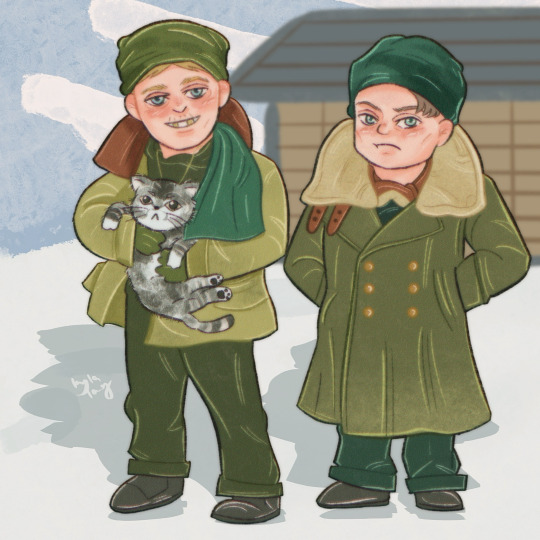
Hammy Murphy and Kitten 👉👈
31 notes
·
View notes
Text
The Germans of Stalag Luft III
One of the films which got me interested in WW2 from an early age is The Great Escape (1963) which is based on the 1944 escape from Stalag Luft 3.

The escape was famous for the sheer number of men who escaped at one time but also the unlawful execution of 50 of the escaped prisoners by the Gestapo on Hitler’s orders.
Apart from the inventiveness of the escape itself, one thing what drew me to the film was the way in which the German officers and guards of the POW camp were depicted. Instead of being cruel and cold these Germans were shown as understanding and considerate. Given that the film was supervised by former POWs and having read several books and articles on the subject there is evidence to show much of this was true for the Luftwaffe camp staff of Stalag Luft 3 and conditions were reportedly a lot better than in other POW camps.
The books talk about life in the camp and also describe the staff of the camp in detail. The person that stands out the most is the Commandant who was based at the camp from 1942 up until the escape in 1944 which led to his court martial. He was remembered by the prisoners for adhering to the Geneva Convention but was also someone they had respect for although they did occasionally pull pranks on him and his staff.
I think it’s important to remember him as a man who did his best given the position he was in but also for being a genuinely good person.
Oberst Friedrich Wilhelm von Lindeiner-Wildau 1880 - 1963

Lindeiner had opposed the Nazi party from as early as the first elections. One reason for this was he had lived with his Dutch wife in the Netherlands in the early 1930’s and could see the effects the Nazis were having on Germany from an outsider’s perspective.
He had been a Colonel in the First World War and had tried to retire before accepting his position as the Commandant of Stalag Luft 3 but was refused due to his high rank. Although not the best outcome he was relieved to be away from the front lines. He was already 62 years old when he took command of Stalag Luft 3.
From his arrival at the camp he sought to improve living conditions for the POWs. Although food rations were beyond his control he discovered Red Cross Parcels were going missing and put a stop to this. He liaised with the senior officers to ensure the men had access to adequate leisure facilities and worked with the YMCA to see this was done. He discussed ways to improve sanitation and a saw that a sewer system was built for the camp, something the nearby German town of Sagan didn’t have.
Orders from High Command were often confusing and contradictory however Lindeiner instructed his staff to treat prisoners as they would wish to be treated. Orders denied prisoners who had died in the camp the right to be buried with military honours but Lindeiner still insisted on this. The orders also depicted on how prisoners should be treated according to country depending on each country’s status. For example Russians could be used for manual labour and were denied by the German government the conditions of the other prisoners had a right to. Lindeiner improved their conditions the best he could despite warnings of close friends that the High Command was keeping tabs on him. He was certain there were men on his staff who were reporting his behaviour.
When he learned through British POWs that the Gestapo was holding a number of prisoners in their custody he began action which would see the prisoners transferred to the Luftwaffe’s care and to his camp. He also intervened when Dutch prisoner Bram Van Der Stok was almost tricked into leaving the camp with the Gestapo, fortunately both Van Der Stok and Lindeiner guessed what they were up to.
When orders from the OKW in early 1944 stated the escaped prisoners should be handed to the Gestapo, Lindeiner feared he may be given an order to execute prisoners within his camp. He later told his deputy Major Gustav Simoleit his concerns about receiving such orders and they both concurred they would rather be executed themselves for insubordination than carry out such an order.
The actual order for the gestapo to execute the escaped prisoners was protested by Göring and a number of senior Wehrmacht officers.
At his court martial in 1944 he was charged with transferring staff whose views were too National Socialist. He denied these claims but said he did remove any staff whose conduct was not morally correct or who didn’t adhere to the Geneva Convention which he made a point of following. He was also charged with being too friendly with the POWs, it was noted he had spent much time speaking with the prisoners and given some of them gifts on their birthdays. He had had a very good relationship with the Senior British Officer.
He was tried by the allies after the war and a number of former POWs testified to his character during his time as the Commandant. Letters were exchanged between himself and former prisoners after the war up until his death.
Stalag Luft III Staff
Lindeiner’s deputy Major Gustav Simoleit, and Captain Hans Pieber were of similar minds and also well respected by the POWs. Simoleit attended the prisoner re-union in 1965 and Pieber was reported to have been visibly upset when he learnt of the executions. It was also said that Pieber turned a blind eye to a few of the escape related activities including lending his camera to the POWs without asking questions.
Another man who was extremely popular with the POWs was Oberfeldwebel Hermann Glemnitz, the sergeant of the Trackers (Ferrets). Unlike his counterpart in the film he was a likeable character showing more curiosity about methods than anger over foiled escape attempts. He attended several of the reunions and even visited a former POW in Canada.

The camp employed hundreds of staff and many of these were too old for military duty, recovering soldiers with injuries and sole survivors in families. Food rations for the staff were similar to that of the prisoners minus the Red Cross parcels so actually worse overall. It was due to this so many of the guards were able to bribed into assisting with the 1944 escape, around 100 in all, but several actually went out of their way to assist including a guard in the watchtower who distracted his colleague while an escape took place but the plan failed and another guard whose wife made stencils for official documents and mailed them back to the camp from her home in Hamburg. It was unfortunate that the relationship between some of the guards deteriorated after the heavy bombing of German cities later in the war.
Recommend books about Stalag Luft 3
The Great Escape: The Full Dramatic Story with Contributions from Survivors and Their Families - Anton Gill
Escape from Stalag Luft III: The True Story of My Successful Great Escape: The Memoir of Bob Vanderstok - Bram Van Der Stok
The True Story of the Great Escape: Stalag Luft III, March 1944 - Jonathan Vance
From Commandant to Captive: The Memoirs of Stalag Luft III Commandant Col. Friedrich Wilhelm von Lindeiner genannt von Wildau - Marilyn Jeffers Walton

7 notes
·
View notes
Text
So I have an ideas for fics but my ADHD has no patience or attention span for actually writing any of it.
So I’ll blog them here, anyone can use them if they want, it will probably go on until the hyper focus is gone so have fun!!
It will mostly be Bucky whump and feels (any remotely ADHD coded character is normally the one I hyper focus on).
Feel free to geek out write drabbles or fics or whatever. Mostly doing this to get it out of my head!
I don’t mind which ships are used, but if it’s not Clegan, Buck and Bucky are very much platonic soulmates in my head.
❤️❤️
#john egan#mastersoftheair#mota#mota fanfic#fanfiction prompts#the brainrot is real#gale cleven#stalag luft iii#john bucky egan#gale buck cleven
7 notes
·
View notes
Text




pictures taken by brian mazza (chloe melas' husband) from MotA's 2021 set.
2 notes
·
View notes
Note
I did my research and the Stalag 3 was a library so they had access to all the books and that is why people started teaching each other many of the prisoners got their law and language and engineer degree at the Stalag. They had the exams to pass their bachelor given to them by the Red Cross. Buck classes were actually really popular and a lot of the prisoners have said that it helped them feel more normal at the camp. They also had a newspaper called Kriegie Times and the Circuit lol. They also played football and volleyball games and had tournament. I’m just imagining stories published about Bucky in the newspaper and how the next Buck classes seat are already sold out.
Thank you so much for sharing, very useful information! I knew about the library, the sports and the newspapers, but the classes part somehow escaped me until one of you guys told me. I think it’s amazing how they tried their best to improve life at the camp.
27 notes
·
View notes
Note
🌹
Johnny turned at the sound of the door opening. His face made it clear that he felt out of his depth, and his relieved, “John!” confirmed that. Only then did Millie look up slowly. Her beautiful, deep-set eyes, which had so often danced with fondness or good humor or been narrowed in careful, intense focus, were shadowed and dull. And there was a fevered, glassy sheen in her eyes, as well. Their eyes met. The resulting barest glimmer of a smile that she somehow managed to muster up was a troubling half-hearted imitation of her usually bright smile. John’s face spasmed at the sight before he got his reactions back under control.
#masters of the air#the sunward verse#wip#brady's pov of millie's arrival at stalag luft iii#ask answered#this is the last of any 🌹asks i'll do for now
5 notes
·
View notes
Text
I might be late to the party, but caught this on the tv last night, and figured it might prove useful to MOTA authors. Not only does it offer everything John Egan could wish to know about the structure and security levels of Stalag Luft III, it also mentions shower rooms within the huts, which opens a whole new realm of Clegan possibilities 😉

2 notes
·
View notes
Text
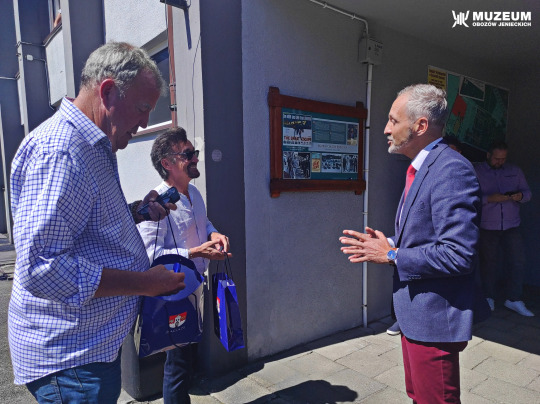



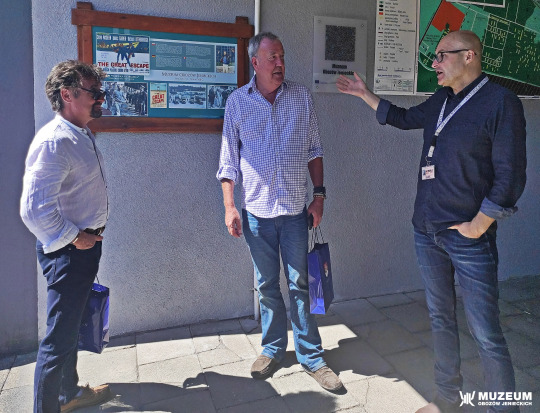
Behind the scenes at the Prison Camps Museum, Żagań (these photos from the museum's Facebook page)
#jeremy clarkson#richard hammond#the grand tour#Eurocrash#the grand tour eurotrash#stalag luft III#the great escape#Muzeum Obozów Jenieckich
15 notes
·
View notes